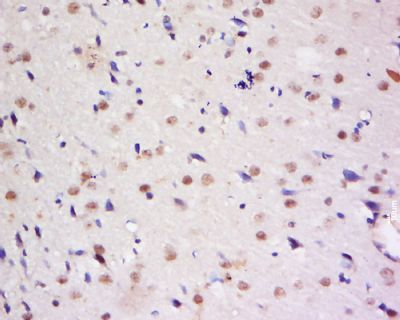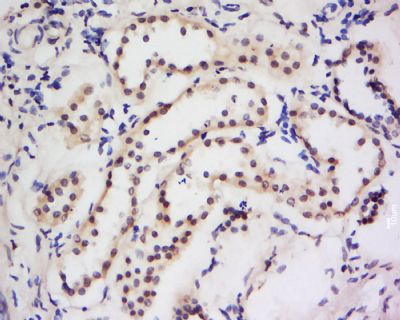Dymeclin Polyclonal Antibody
Purified Rabbit Polyclonal Antibody (Pab)
- SPECIFICATION
- CITATIONS
- PROTOCOLS
- BACKGROUND

Application
| WB, IHC-P, IHC-F, IF, ICC, E |
|---|---|
| Primary Accession | Q7RTS9 |
| Reactivity | Rat, Dog, Bovine |
| Host | Rabbit |
| Clonality | Polyclonal |
| Calculated MW | 76 KDa |
| Physical State | Liquid |
| Immunogen | KLH conjugated synthetic peptide derived from human Dymeclin |
| Epitope Specificity | 151-250/669 |
| Isotype | IgG |
| Purity | affinity purified by Protein A |
| Buffer | 0.01M TBS (pH7.4) with 1% BSA, 0.02% Proclin300 and 50% Glycerol. |
| SUBCELLULAR LOCATION | Cytoplasmic and Golgi Apparatus |
| SIMILARITY | Belongs to the dymeclin family. |
| SUBUNIT | Interacts with GOLM1 and PPIB. |
| Post-translational modifications | Myristoylated in vitro; myristoylation is not essential for protein targeting to Golgi compartment. |
| DISEASE | Defects in DYM are the cause of Dyggve-Melchior-Clausen syndrome (DMC) [MIM:223800]. DMC is a rare autosomal recessive disorder characterized by short trunk dwarfism, microcephaly and psychomotor retardation. Electron microscopic study of cutaneous cells of affected patients shows dilated rough endoplasmic reticulum, enlarged and aberrant vacuoles and numerous vesicles. DMC is progressive. Defects in DYM are the cause of Smith-McCort dysplasia (SMC) [MIM:607326]. SMC is a rare autosomal recessive osteochondrodysplasia characterized by short limbs and trunk with barrel-shaped chest. The radiographic phenotype includes platyspondyly, generalized abnormalities of the epiphyses and metaphyses, and a distinctive lacy appearance of the iliac crest, features identical to those of Dyggve-Melchior-Clausen syndrome. |
| Important Note | This product as supplied is intended for research use only, not for use in human, therapeutic or diagnostic applications. |
| Background Descriptions | Dyggve-Melchior-Clausen syndrome (DMC), a rare autosomal recessive disorder, is characterized by microcephaly, short trunk dwarfism and sometime psychomotor retardation. Cutaneous cells of affected individuals show dilated rough endoplasmic reticulum and enlarged vacuoles. The Dyggve-Melchior-Clausen syndrome protein, also designated dymeclin, may play a role in proteoglycan metabolism and intracellular protein digestion. It is a widely expressed multi-pass membrane protein, detected primarily in chondrocytes and fetal brain tissue. Defects in dymeclin are also the cause of Smith-McCort dysplasis syndrome (SMC), which has characteristics identical to those of Dyggve-Melchior-Clausen syndrome. |
| Gene ID | 54808 |
|---|---|
| Other Names | Dymeclin, Dyggve-Melchior-Clausen syndrome protein, DYM |
| Target/Specificity | Expressed in most embryo-fetal and adult tissues. Abundant in primary chondrocytes, osteoblasts, cerebellum, kidney, lung, stomach, heart, pancreas and fetal brain. Very low or no expression in the spleen, thymus, esophagus, bladder and thyroid gland. |
| Dilution | WB=1:500-2000,IHC-P=1:100-500,IHC-F=1:100-500,ICC=1:100-500,IF=1:100-500,ELISA=1:5000-10000 |
| Storage | Store at -20 ℃ for one year. Avoid repeated freeze/thaw cycles. When reconstituted in sterile pH 7.4 0.01M PBS or diluent of antibody the antibody is stable for at least two weeks at 2-4 ℃. |
| Name | DYM |
|---|---|
| Function | Necessary for correct organization of Golgi apparatus. Involved in bone development. |
| Cellular Location | Cytoplasm. Golgi apparatus. Membrane; Lipid-anchor. Note=Sequence analysis programs clearly predict 1 transmembrane region. However, PubMed:18996921 shows that it is not a stably anchored transmembrane protein but it weakly associates with the Golgi apparatus and shuttles between the Golgi and the cytosol |
| Tissue Location | Expressed in most embryo-fetal and adult tissues. Abundant in primary chondrocytes, osteoblasts, cerebellum, kidney, lung, stomach, heart, pancreas and fetal brain. Very low or no expression in the spleen, thymus, esophagus, bladder and thyroid gland |

Thousands of laboratories across the world have published research that depended on the performance of antibodies from Abcepta to advance their research. Check out links to articles that cite our products in major peer-reviewed journals, organized by research category.
info@abcepta.com, and receive a free "I Love Antibodies" mug.
Provided below are standard protocols that you may find useful for product applications.
If you have used an Abcepta product and would like to share how it has performed, please click on the "Submit Review" button and provide the requested information. Our staff will examine and post your review and contact you if needed.
If you have any additional inquiries please email technical services at tech@abcepta.com.













 Foundational characteristics of cancer include proliferation, angiogenesis, migration, evasion of apoptosis, and cellular immortality. Find key markers for these cellular processes and antibodies to detect them.
Foundational characteristics of cancer include proliferation, angiogenesis, migration, evasion of apoptosis, and cellular immortality. Find key markers for these cellular processes and antibodies to detect them. The SUMOplot™ Analysis Program predicts and scores sumoylation sites in your protein. SUMOylation is a post-translational modification involved in various cellular processes, such as nuclear-cytosolic transport, transcriptional regulation, apoptosis, protein stability, response to stress, and progression through the cell cycle.
The SUMOplot™ Analysis Program predicts and scores sumoylation sites in your protein. SUMOylation is a post-translational modification involved in various cellular processes, such as nuclear-cytosolic transport, transcriptional regulation, apoptosis, protein stability, response to stress, and progression through the cell cycle. The Autophagy Receptor Motif Plotter predicts and scores autophagy receptor binding sites in your protein. Identifying proteins connected to this pathway is critical to understanding the role of autophagy in physiological as well as pathological processes such as development, differentiation, neurodegenerative diseases, stress, infection, and cancer.
The Autophagy Receptor Motif Plotter predicts and scores autophagy receptor binding sites in your protein. Identifying proteins connected to this pathway is critical to understanding the role of autophagy in physiological as well as pathological processes such as development, differentiation, neurodegenerative diseases, stress, infection, and cancer.



